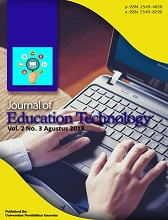“Bitmoji is Cool!”: Exploring the Secondary English Teachers’ Narratives Using Digital Avatar-based Pedagogical Agent
DOI:
https://doi.org/10.23887/jet.v8i3.76632Keywords:
Bitmoji Virtual Classroom, EFL, narrative inquiry, digital avatar-based pedagogical agentAbstract
In online learning, students are likely to experience boredom, lack of motivation, reluctance, and anxiety. Bitmoji Virtual Classroom (BVC) – a virtual classroom can be one option in implementing interactive learning. This study aims to investigate the experiences of English teachers in designing interesting and interactive English learning using Bitmoji Virtual Classroom (BVC) – a virtual classroom designed as a digital avatar-based learning agent in online learning – to increase students’ interest, engagement, and motivation to learn. Using a narrative inquiry approach, this study explores the experiences of four junior high school English teachers who voluntarily participated. Data were collected through in-depth interviews and analyzed thematically. The findings show that teachers find the process of designing virtual classrooms enjoyable, aided by the attractive features of Bitmoji and Google Slides. They support the creation of effective learning and better student engagement through the help of this interactive learning media. However, they face challenges, such as the need for clearer learning guidelines during the implementation of the interactive media used. This study suggests that the use of avatar-based virtual classrooms can serve as an innovative strategy to develop creativity and increase student motivation in a virtual English learning environment.
Published
How to Cite
Issue
Section
License
Copyright (c) 2024 mhsantosa, Safitry Wahyuni

This work is licensed under a Creative Commons Attribution-ShareAlike 4.0 International License.
Authors who publish with the Journal of Education Technology agree to the following terms:
- Authors retain copyright and grant the journal the right of first publication with the work simultaneously licensed under a Creative Commons Attribution License (CC BY-SA 4.0) that allows others to share the work with an acknowledgment of the work's authorship and initial publication in this journal.
- Authors are able to enter into separate, additional contractual arrangements for the non-exclusive distribution of the journal's published version of the work (e.g., post it to an institutional repository or publish it in a book), with an acknowledgment of its initial publication in this journal.
- Authors are permitted and encouraged to post their work online (e.g., in institutional repositories or on their website) prior to and during the submission process, as it can lead to productive exchanges, as well as earlier and greater citation of published work. (See The Effect of Open Access)

















